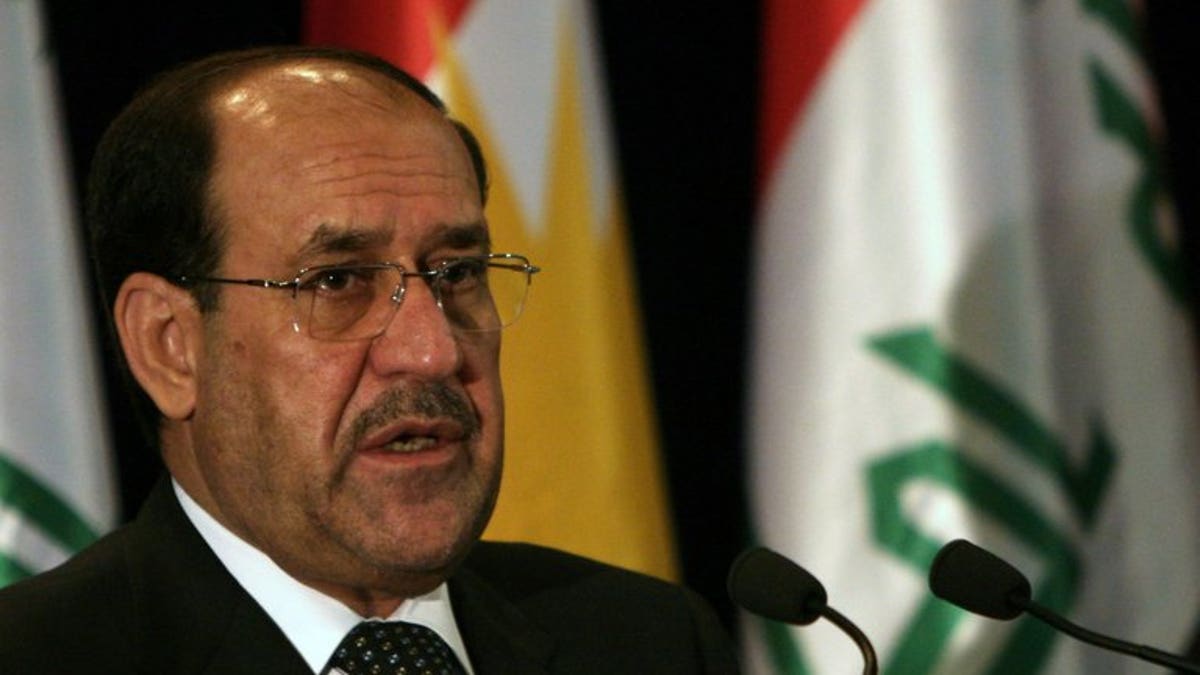
Iraqi Prime Minister Nuri al-Maliki speaks during a joint press conference with Kurdish regional president Massoud Barzani in the northern Iraqi Kurdish city of Arbil on June 9, 2013. Maliki is to visit India, officials said Wednesday, to push for investment in much-needed reconstruction as New Delhi looks to secure critical energy supplies. (AFP/File)
BAGHDAD (AFP) – Iraqi Prime Minister Nuri al-Maliki is to visit India, officials said Wednesday, to push for investment in much-needed reconstruction as New Delhi looks to secure critical energy supplies.
The premier's three-day trip to New Delhi and Mumbai, the first by an Iraqi leader since the 2003 US-led invasion ousted president Saddam Hussein, comes on the heels of a visit by Indian Foreign Minister Salman Khurshid to Baghdad in June.
But the prospects of luring foreign investment to Iraq have been complicated as the country has been hit by its worst violence since 2008, with the interior ministry describing Iraq as a "battleground".
Maliki will set off on Thursday with a delegation including the ministers of oil, health and agriculture, the head of Iraq's national investment commission, and several advisors.
He is due to meet with his Indian counterpart Manmohan Singh, as well as India's President Pranab Mukherjee and other top officials and leaders, according to Suresh Reddy, India's envoy to Baghdad.
"It is a very important visit," Maliki's spokesman Ali Mussawi told AFP. "It will mark a major change in relations between Iraq and India, a big step forward."
Mussawi said discussions would focus on energy, but also housing, healthcare, education and railways.
"Naturally ... economic considerations would be a big part of bilateral discussions," Reddy said.
"Since energy is of critical importance to Iraq, and India being dependent on imported energy, so energy would constitute a very important component of the discussions."
"But it's not just trade alone."
Reddy said Indian exports to Iraq totalled around $1.3 billion in 2012, up from $740 million in 2011, while Baghdad's exports to India -- the vast majority of which were oil -- totalled more than $20 billion last year, compared to around $9 billion in 2011.
Iraq, which currently exports around 2.3 million barrels per day (bpd) of oil, is looking to dramatically boost its energy output, with officials aiming for overall production capacity of 9 million bpd by 2017.
Baghdad is almost entirely dependent on oil sales for income, and while efforts to boost energy production have resulted in a significant increase in output, steps to diversify the country's economy have sputtered.
India, meanwhile, has made clear its requirement to secure energy supplies to drive economic growth and development, with its dependence on Iraqi exports increasing as sanctions have limited Iran's oil sales.
While in Baghdad in June, Khurshid insisted that India also wanted to promote investment in other fields in Iraq.
But whereas firms from the West, Turkey, South Korea and China have sought to win major government contracts in Iraq as Baghdad looks to restore its war-battered infrastructure and dilapidated economy, Indian companies have been noticeably absent.
Considerations of investment in Iraq have been complicated by a marked spike in violence in recent months that authorities have failed to stem.
More than 1,000 people died as a result of violence last month, the United Nations said, the highest such figure since 2008, and more than 400 have been killed already this month, according to an AFP tally.
